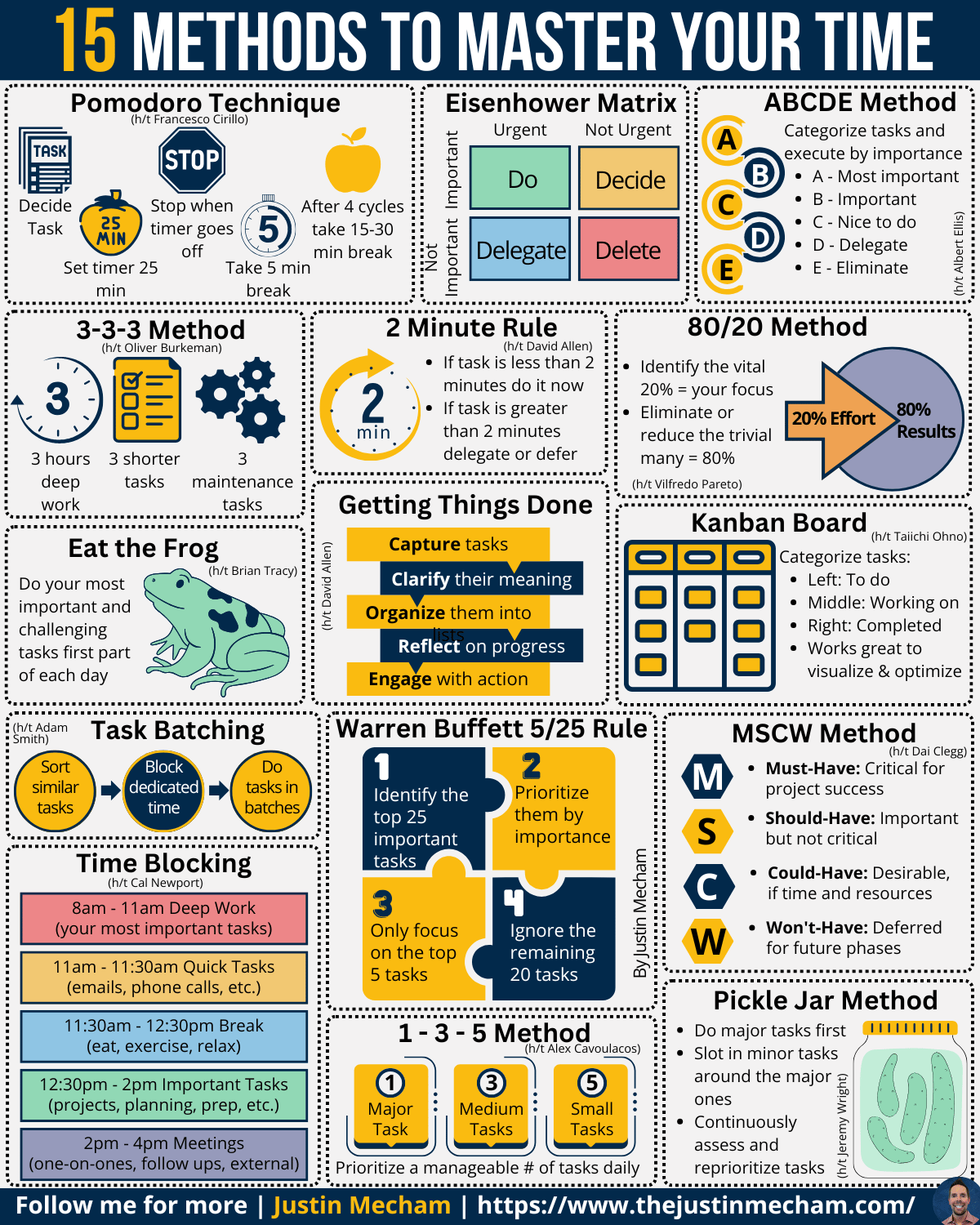Hey Full Potential Zoners!
Time isn’t the problem - the way you use it is.
You have the same hours as everyone else.
The difference? How you choose to use them.
And once time is gone - you can’t get it back.
I created an online version of my live cohort at a 94% lower cost!
🏆 Everything the live cohort has - just do it at your own pace
✔ 550+ Prompts for ANY Work & Life Situation
✔ Learn to Master ChatGPT, Gemini, Claude, Copilot
✔ Results You’ll See Fast
✔ Yours for Life - Learn on Your Schedule
✔ Clear, Step-by-Step Execution
✔ No Confusion, No Guesswork
✔ No Tech Skills? No Problem.
✔ Save Hours, Cut Costs, Work Smarter
✅ AND SO MUCH MORE
👉 Every day without AI in your leadership is a missed opportunity.
No one can control time - but you can control how you use it.
Start small. Pick one method. Try it this week.
Because time management isn’t about doing more - it’s about doing what matters most.
Today we are going to help leaders master this by using the:
‘15 Methods to Master Your Time'.
Let’s dive in!


Download This PDF + my Top 60+ Cheat Sheets At Bottom of Email
Real-Life Scenarios for Mastering Your Time
Managing a Heavy Workload as a Project Manager
Scenario: You’re balancing multiple projects, client meetings, and deadlines.
Eisenhower Matrix:
Start by sorting tasks into Do, Decide, Delegate, and Delete to prioritize urgent vs. non-urgent work.
Task Batching:
Group similar tasks like responding to emails and creating reports, so you don’t switch focus constantly.
Pomodoro Technique:
Set a 25-minute timer to work intensely on a single task, followed by a 5-minute break to reset before the next batch of work.
Preparing for a Big Presentation Without Last-Minute Stress
Scenario: You have a major presentation coming up, and you want to avoid rushing at the last minute.
Eat the Frog:
Work on the presentation first thing in the morning before distractions get in the way.
1-3-5 Method:
Set your daily focus: 1 major task (finalizing slides), 3 medium tasks (practicing delivery, checking data, refining key points), and 5 small tasks (fixing slide errors, emailing team, checking projector, etc.).
Warren Buffett 5/25 Rule:
List everything you could do, then focus only on the top 5 most important tasks related to your presentation. Ignore the rest.
Staying Productive While Working Remotely
Scenario: Distractions are everywhere when working from home, and tasks pile up fast.
Time Blocking:
Divide your day into structured work sessions (deep work, quick tasks, meetings, and breaks) to stay organized.
Kanban Board:
Create a visual board for tasks in To Do, In Progress, and Completed sections so you stay focused on what matters.
2-Minute Rule:
If something takes less than 2 minutes (responding to a quick email, logging a task, confirming a meeting), do it immediately instead of letting it pile up.
Juggling Personal and Work Responsibilities Without Feeling Overwhelmed
Scenario: You’re trying to balance work, family, and personal projects, but it feels like there’s never enough time.
Pickle Jar Method:
Schedule your day around the biggest tasks first (work deadlines), followed by medium and small ones (errands, chores, self-care).
80/20 Rule:
Identify the 20% of tasks that bring 80% of the results—focus on those, and let go of unnecessary busywork.
MSCW Method:
Categorize everything into Must-Have, Should-Have, Could-Have, and Won’t-Have to filter what truly matters.
Keeping Up with Learning and Professional Growth
Scenario: You want to upskill but struggle to fit learning into your busy schedule.
Getting Things Done:
Capture everything you need to learn, clarify why it matters, and organize it into smaller steps so it doesn’t feel overwhelming.
ABCDE Method:
Rank your learning priorities—A (most critical), B (important but not urgent), C (nice to do), D (delegate if possible), E (eliminate distractions).
3-3-3 Method:
Dedicate 3 hours to deep learning, spend time on 3 smaller tasks (reading, note-taking, summarizing), and 3 maintenance activities (reviewing progress, organizing notes, applying knowledge).

Your focus tells people what is important before you ever say a word.
A full calendar does not mean a productive life, it only means more commitments.
Every hour reflects what you choose to build, protect, or waste.
Where you put your time is where you will find your results.
What you control shapes what you accomplish - what you ignore decides what you miss.
Your time is the one resource that can never be recovered.
Until next time and with lots of love,
Justin

📑 Today’s PDF
Download Today’s PDF by Clicking Here
📑 Justin’s Top 60+ Cheat Sheets
Download All 60+ PDFs by Clicking Here
Were you forwarded this email? Subscribe and get my free eBook Click Here
Want to Sponsor this newsletter or a LinkedIn post? Click Here


